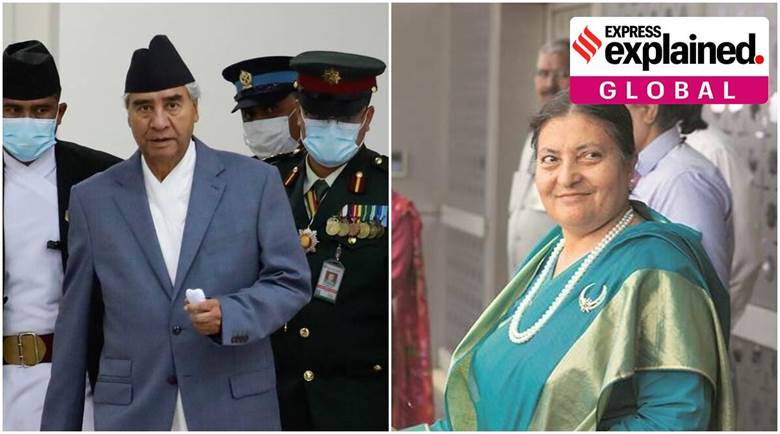Description

Copyright infringement not intended
Context:
Nepal is in a constitutional crisis with major organs of the state confronting each other. Chief Justice Cholendra Shumsher Rana is under undeclared house arrest. Prime Minister Sher Bahadur Deuba, who is backed by the chiefs of four major coalition partners, is at loggerheads with President Bidhya Devi Bhandari. The President, on her part, is giving sleepless nights to the politicians about her next move — which includes the possibility of her seeking to rule as an extra-constitutional authority beyond the sanction and imagination of the Constitution that completed six years last week.

Details:
- The current crisis began after President Bhandari refused to ratify Nepal’s citizenship bill,which was sent to her twice after it was passed by both Houses of Parliament over the span of a month.
- The bill seeks to give citizenship by birth and by descent to an estimated 500,000 individuals, and non-voting citizenship to non-resident Nepalis living in non-SAARC countries.
- After President Bhandari returned the bill with about a dozen queries, Parliament sent it back “as it was”.
- Apparently insulted, she held a series of consultations with both protagonists and antagonists of the bill, including retired officers of the Nepal army and police, lawyers, journalists, and civil society representatives, but ultimately did nothing as the deadline for her to ratify the bill passed.
- There are fears that the impasse might lead to a collapse of Nepal’s constitutional system.
- The public opinion on the bill is divided, and there are questions about its timing — with elections already announced on November 20. There are also questions about the government’s intention in bringing the bill without wider consultations, and looking into why two earlier attempts at settling the citizenship issue — in 1991 and 2006 — did not succeed.
- Deuba’s fifth term as PM in less than three decades of unstable government began in July 2021 after a Constitution Bench of the Supreme Court led by Chief Justice Rana struck down President Bhandari’s decision to prematurely dissolve Parliament for the second time in less than six months on the recommendation of the K P Oli-led government without exploring the formation of an alternative government.
- This is also not the first time that a President has been accused of undermining the constitution. Ram Baran Yadav, the first President after Nepal became a republic in May 2008, had reinstated Rookmangud Katwal as Army chief within 24 hours of his being sacked by then PM Prachanda.
- Impeachment is the only way in which an errant President can be punished. The death of the House, however, has given a protective shield to Bhandari.
- The ruling coalition has been weighing the option of going to the court, even though the credibility of the judiciary is at its lowest ebb currently.
- Notifying the bill approved by Parliament in the gazette even without the President’s seal is an option — however, a government treating the President as persona non grata may be interpreted as the end of the republic.
https://indianexpress.com/article/explained/explained-global/explained-nepal-breakdown-of-constitution-8167271/












